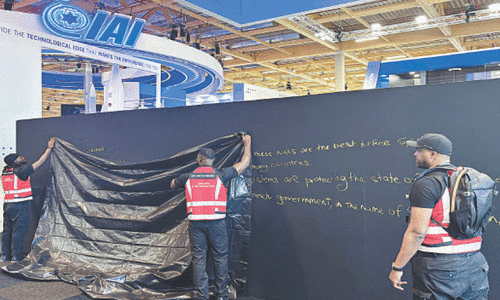• New Delhi possessed 172 warheads in 2024, 180 in 2025
• SIPRI data says Pakistan continues development of new delivery systems, accumulation of fissile material
ISLAMABAD: India is adding to its nuclear stockpile, while Pakistan continues the development of new delivery systems, according to an annual report by a Swedish armament watchdog.
The arms race in South Asia is a microcosm of the “dangerous new nuclear arms race” that is emerging across the globe, as nearly all nuclear-armed states continued to modernise their arsenals in 2024, the Stockholm International Peace Research Institute (SIPRI) said.
In its annual yearbook, SIPRI warned that the nine nuclear powers — the United States, Russia, the United Kingdom, France, China, India, Pakistan, North Korea and Israel — are not only upgrading existing stockpiles, but also developing new nuclear weapons, amid the steady erosion of international arms control agreements.
The report highlights the continuing deterioration of global security, exacerbated by wars in Ukraine and Gaza.
“It is critical to remember that nuclear weapons do not guarantee security,” said Matt Korda, an Associate Senior Researcher with SIPRI’s Weapons of Mass Destruction Programme.
“As the recent flare-up of hostilities in India and Pakistan amply demonstrated, nuclear weapons do not prevent conflict. They also come with immense risks of escalation and catastrophic miscalculation — particularly when disinformation is rife — and may end up making a country’s population less safe, not more.”
India-Pakistan tensions
The yearbook notes that tensions between India and Pakistan briefly spilled over into armed conflict in early 2025. Both nations continued to develop new types of nuclear delivery systems in 2024.
India is believed to have slightly expanded its arsenal, increasing its stored warheads from 172 in 2024 to 180 in 2025.
Pakistan’s stockpile of 170 stored warheads remained unchanged, but the report notes its continued development of new delivery systems and accumulation of fissile material suggest its arsenal might expand over the coming decade.
India has been developing new “canisterised” missiles, which allow warheads to be transported while mated to the missile. This, along with sea-based patrols, suggests a strategic shift toward keeping some nuclear weapons deployed with their launchers during peacetime.
“These weapons are assigned to a maturing nuclear triad of aircraft, land-based missiles and nuclear-powered ballistic missile submarines”, the report said.
Both India and Pakistan are pursuing the capability to deploy multiple warheads on ballistic missiles.
While Pakistan remains the focus of India’s nuclear deterrent, the report states that India appears to be placing growing emphasis on longer-range weapons capable of reaching targets throughout China.
Big powers
Of the total global inventory of about 12,241 warheads in January 2025, about 9,614 were in military stockpiles for potential use.
An estimated 3,912 of those were deployed with missiles and aircraft, with around 2,100 kept in a state of high operational alert on ballistic missiles, all but a few belonging to Russia or the U.S.
According to the report, China’s nuclear arsenal has grown faster than that of any other country, reaching an estimated 600 warheads by early 2025.
Beijing has advanced work on about 350 new missile silos, and the report suggests China could have as many intercontinental ballistic missiles as either Russia or the US by the turn of the decade.
Russia and the US, together, still possess around 90 per cent of all nuclear weapons in the world. While their military stockpiles remained stable in 2024, both are implementing extensive modernisation programs.
The report warns of a likely increase in the number of warheads deployed on strategic missiles after the bilateral New START treaty expires in February 2026, unless a new agreement is reached.






